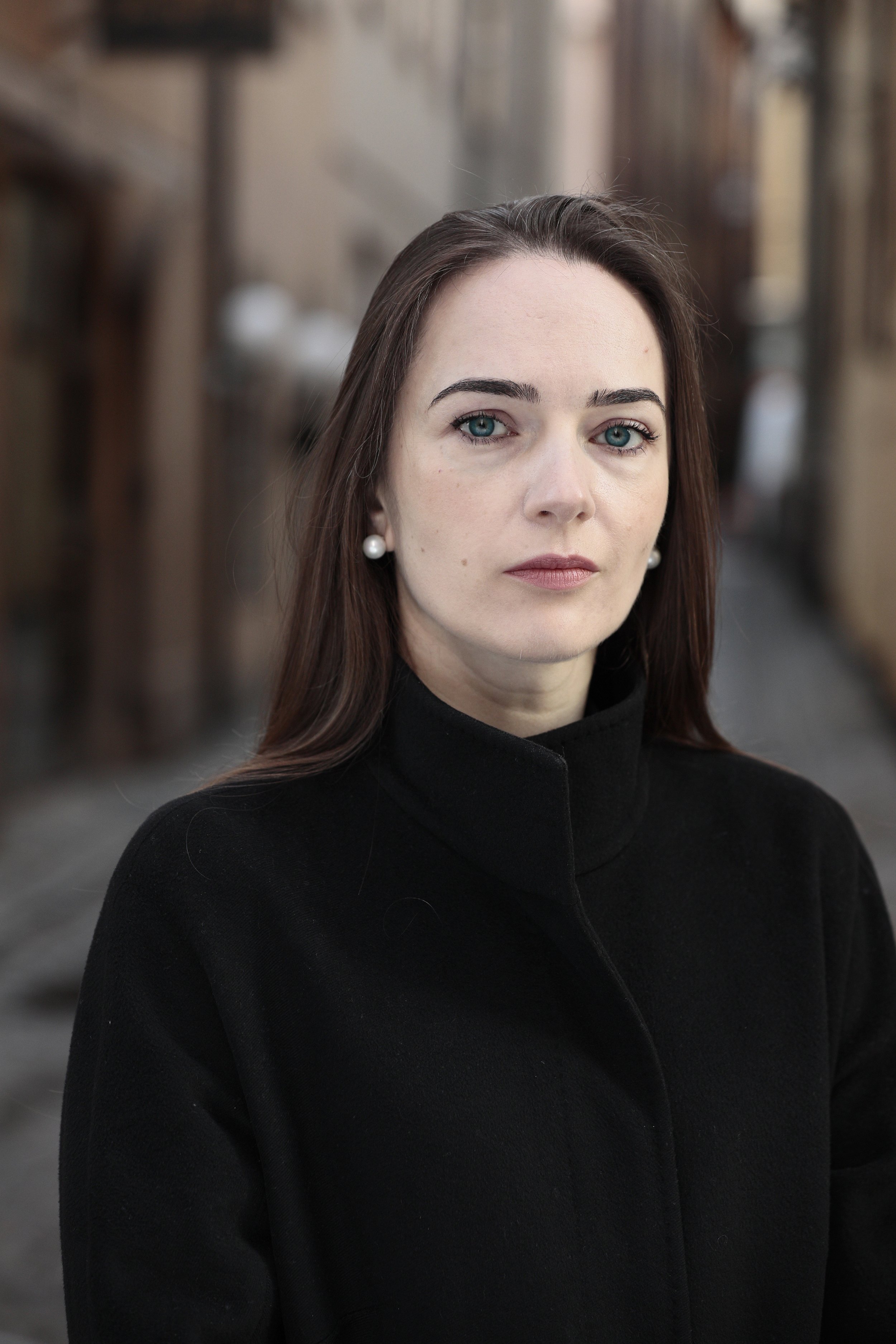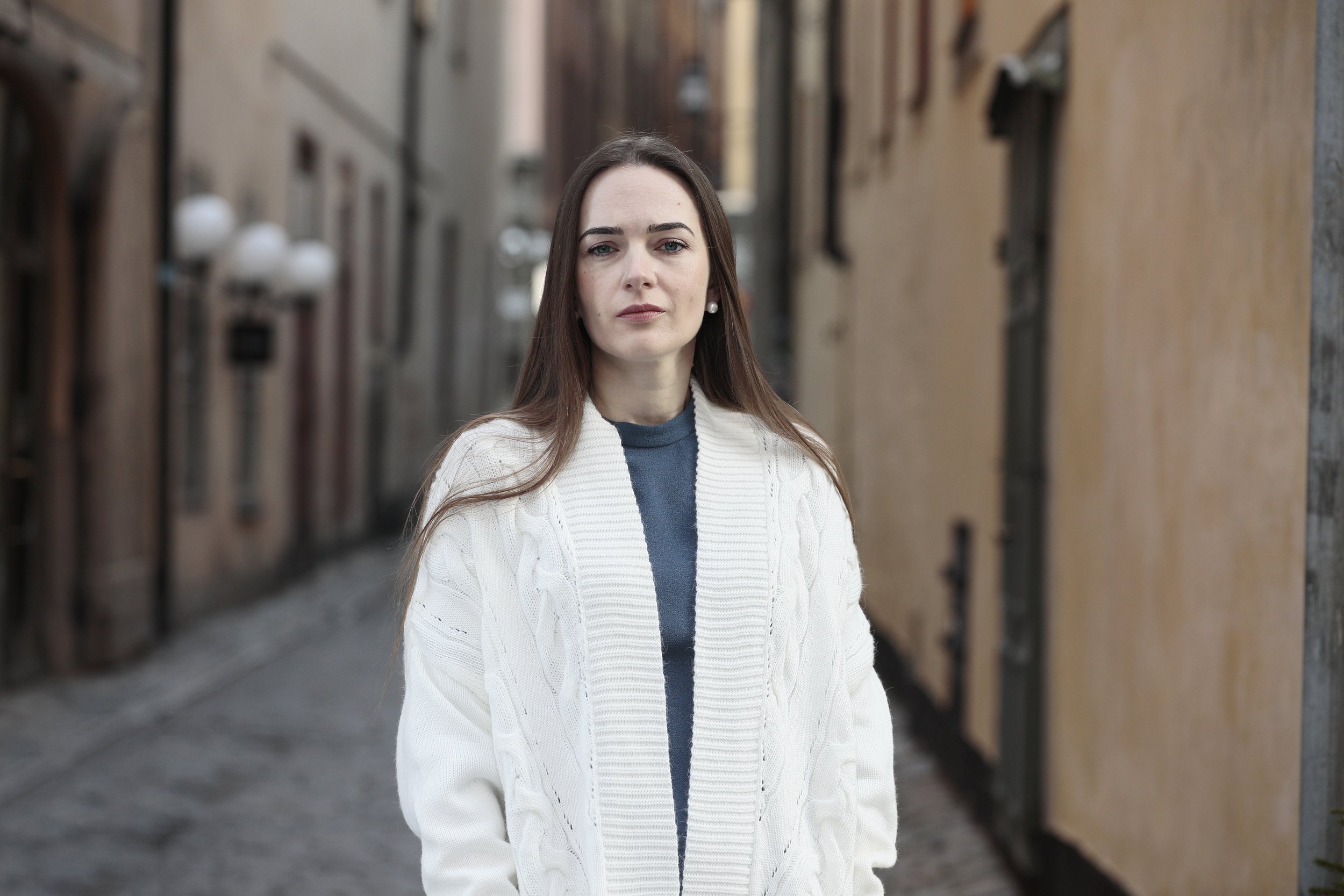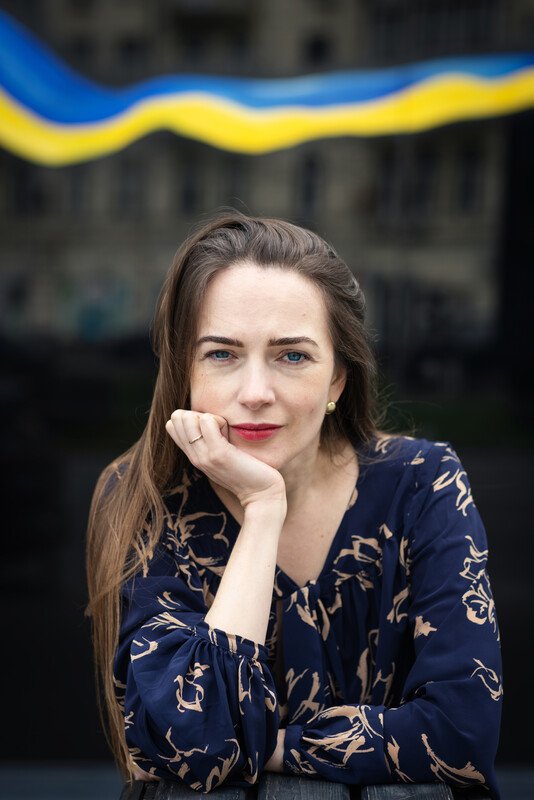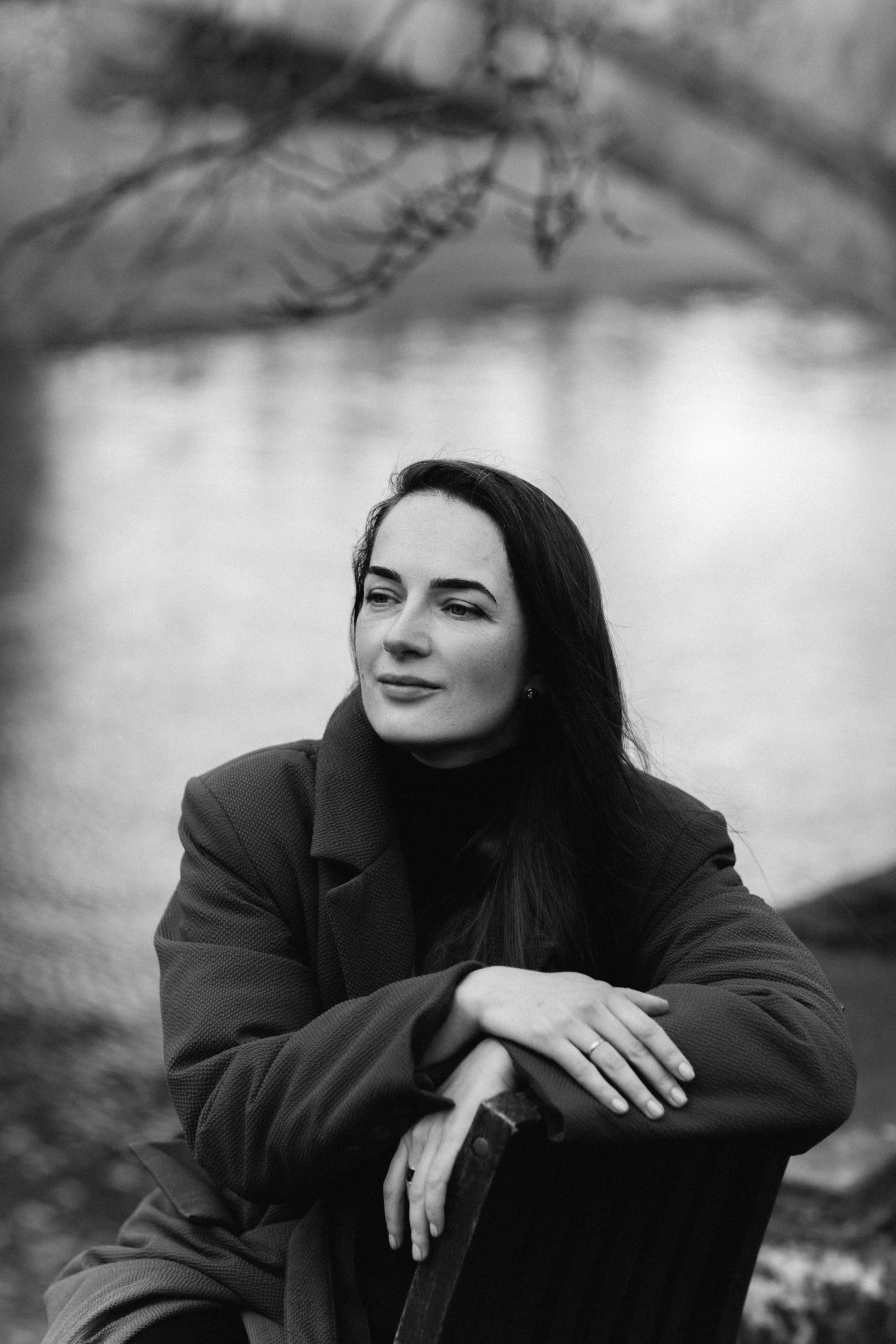Journalism and Challenges During Wartime with Nobel Peace Prize Recipient Oleksandra Matviichuk

In this educational program recorded on April 18, journalist Patricia Vasconcellos, Board Member of the Association of Foreign Press Correspondents in the USA (AFPC-USA) and the White House Correspondent for the Brazilian television network SBT, engages in conversation with Oleksandra Matviichuk, a Nobel Peace Prize laureate, human rights lawyer, and head of the Ukraine Center for Civil Liberties (CCL). Founded in 2007, CCL has been involved in monitoring political persecutions, documenting war crimes and crimes against humanity, and advocating for victims of the Russian invasion in Ukraine.
Oleksandra Matviichuk
Topics covered in the educational program include:
Matviichuk's exceptional work in defending human rights in Ukraine.
An overview of the efforts and impact of the Center for Civil Liberties.
Key points foreign journalists should keep in mind when covering the war in Ukraine.
The potential impact of the upcoming U.S. election on the situation in Ukraine and its citizens.
Challenges in achieving a universal standard of human rights for all.
Matviichuk is a human rights lawyer and civil society leader based in Kyiv. She heads the non-profit organization Center for Civil Liberties, which received the Nobel Peace Prize in 2022. Matviichuk also coordinates the Euromaidan SOS initiative group. The Center for Civil Liberties focuses on protecting human rights and promoting democracy in Ukraine and the OSCE region.
Matviichuk's expertise includes creating horizontal structures to mobilize people in human rights activities against attacks on rights and freedoms. She has extensive experience documenting violations during armed conflicts and has authored numerous alternative reports for various international bodies such as the UN, the Council of Europe, the European Union, the OSCE, and the International Criminal Court. In 2016, she was honored with the Democracy Defender Award for her outstanding contribution to promoting democracy and human rights by the OSCE missions. Matviichuk is also the recipient of the 2017 Ukraine's Woman of Courage Award from U.S. Ambassador to Ukraine Marie L. Yovanovitch, the Hillary Rodham Clinton Award, and the 2022 Right Livelihood Award. The Financial Times named Matviichuk one of the top 25 most influential women in the world.
AFPC-USA is solely responsible for the content of this educational program. Below, readers will find a summary of some of the most important takeaways from the presentation.
ON WHAT INSPIRED HER CAREER JOURNEY AND THE WORK OF CCL
As a child, Matviichuk was inspired by Soviet dissidents who spoke up bravely against the oppressive regime. This influence led her to study law and commit herself to fighting for “freedom and human dignity.” After graduating from university, Matviichuk founded CCL, starting with human rights education to democratize the country. She emphasized the importance of instilling values of human rights and democracy within society, beyond just adopting formal laws and institutions. Through educational events, CCL involved ordinary people in human rights work, empowering them to make a difference.
Matviichuk highlights her role during the Revolution of Dignity 10 years ago, when she coordinated a civil initiative to provide legal and other support to persecuted protesters. The movement led to significant democratic change in Ukraine as the authoritarian regime fell. However, Russia responded by invading and occupying parts of Ukraine.
CCL's mission is to fight for human rights and freedom across various contexts and these fights “have no limitation in national borders.” The organization collaborates with “human rights defenders from other parts of the globe.”
ON WHAT SHE LEARNED FROM PEOPLE WHO SURVIVED RUSSIAN CAPTIVITY
Matviichuk shares her experiences interviewing hundreds of Ukrainians who survived Russian captivity, revealing the severe abuses they endured. These included being beaten, raped, confined in small spaces, having their fingers cut off, nails removed or drilled, and undergoing electric shocks. One woman even had her eye gouged out with a spoon. Matviichuk emphasizes that there was no military necessity for such torture; instead, it seemed to be inflicted because the Russians could.
She recounts a specific story of a young Ukrainian woman who was unlawfully arrested for her pro-Ukrainian sentiments, despite being a citizen of Ukraine. The woman was severely beaten with a metal stick while pregnant, and her captors told her that her child had no right to be born because of her beliefs. She was eventually told she could be released if she falsely claimed she was a spy, which she agreed to for her survival. Matviichuk expresses her shock at the callousness of the Russian journalist who staged an interview with the woman, requesting her to hide her pregnancy to fit the narrative that she was a spy.
Gallery photos: Right Livelihood (far and center left); Center for Civil Liberties (center right); Dasha Tenditna (far right).
ON HOW FOREIGN JOURNALISTS CAN APPROACH COVERAGE OF RUSSIA’S INVASION
Matviichuk expresses her deep gratitude to journalists from around the world for their professional coverage of the Ukraine war, emphasizing the importance of their work in exposing the truth amidst Russian disinformation and propaganda efforts.
She stresses that Ukrainians want peace “more than anyone else,” but true peace does not come from merely ceasing hostilities. Instead, it requires the end of occupation, which is another form of war that brings disappearances, torture, rapes, denial of identity, child abduction, filtration camps, and mass graves. Matviichuk underscores her expertise in documenting war crimes over the past decade and the dire circumstances faced by those living under Russian occupation.
Matviichuk argues that calls for Ukraine to stop fighting and give up territories to satisfy Russia's imperialist ambitions are both wrong and immoral. She believes that such actions would not halt Russian President Vladimir Putin's aggression but would instead allow it to continue unchecked. Furthermore, abandoning people to torture and death under Russian occupation cannot be a “political compromise,” as it would leave innocent lives at risk.
ASSORTED THOUGHTS ON “PEACE” AS A CONCEPT
Matviichuk emphasizes that peace must be understood as freedom from fear and violence, offering a long-term perspective and hope for a future for oneself and one's children. She asserts that peace is not the same as occupation. The ongoing war in Ukraine is not only a conflict between two states but also a struggle between authoritarianism and democracy. She notes that the conflict started in 2013 when Ukraine pursued democratic transition following the Revolution of Dignity. Russia invaded because it feared the idea of freedom. Matviichuk warns that if Putin is not stopped in Ukraine, he will continue to expand his reach and attack other countries.
Matviichuk was initially surprised by her receipt of the Nobel Peace Prize, as she considers herself an “ordinary human rights lawyer” fighting for freedom and dignity like many others. She had no knowledge of being nominated for the award. Upon reflection, she felt a greater sense of responsibility as a result of receiving the prize during a bloody war in Ukraine. She believes it provides an opportunity for her work to be heard.
Matviichuk expresses concern about the collapse of the international order, which is based on the United Nations Charter and international law. She notes that the current system is struggling to protect people from wars and authoritarian regimes. Matviichuk warns that if action is not taken soon, conflicts may continue to spread across the world. She believes Russia's war against Ukraine is significant as Putin attempts to undermine the values of democracy, rule of law, and human rights. If Russia succeeds, it may embolden other authoritarian leaders, including those in China and Iran, to pursue similar actions.
Matviichuk emphasizes the need for politicians to make decisions based on human rights and freedoms, rather than solely considering political, economic, security, or geopolitical interests. She argues that while a politician might benefit in the short term from decisions not rooted in these values, it could lead to “catastrophe” in the long term. She asserts that peace and human rights are closely linked and that history demonstrates how countries that violate the rights of their own citizens, persecute civil society, and oppress peaceful demonstrations pose threats not only to their citizens but to global peace as well.
ON WHETHER SANCTIONS AGAINST RUSSIA HAVE BEEN EFFECTIVE
Matviichuk stresses the importance of sanctions in curbing Russia's ability to finance the war in Ukraine. However, she points out that Russia finds ways to bypass sanctions and continue obtaining materials from countries that are supposed to be enforcing the sanctions regime. She expresses concern about the presence of elements from countries like the United States, Germany, France, and Italy in Russian drones and aircraft. This indicates that sanctions may not be as effective as intended due to loopholes or “backdoors” in enforcement.
Matviichuk stresses the need for democracies to support each other more robustly, particularly in the face of authoritarian regimes collaborating to undermine democratic values. She notes Russia's substantial military spending and preparations for a new major attack on Ukraine.
She also highlights the challenges posed by blocked military support to Ukraine in the U.S. Congress, which emboldens Putin. Putin's denial of Ukrainian existence and his genocidal claims contribute to the reality on the ground, where Russian forces deliberately target local Ukrainians and attempt to erase their identity through either re-education or extermination. She recognizes that there are well-intentioned Russians who support ending the war but notes that the “majority of Russian people” view the war as a means to “enforce restoration of the Russian empire.”
ON THE 2024 U.S. ELECTION’S POTENTIAL IMPACT ON UKRAINE
Matviichuk acknowledges that the 2024 U.S. election is a decision for the American people, but she emphasizes the significant impact the outcome will have on external policy and global events. She notes that in the coming year, people in 84 countries will participate in elections, impacting half of the world's population. However, Matviichuk highlights that 80% of the global population lives in non-free or partially free societies, meaning the minority of people who have the true right to vote may be influenced by the choices made by citizens in free societies.
She warns that many people in democratic countries have taken freedom and democracy for granted, as they have inherited these values and systems from previous generations without actively fighting for them. As a result, some individuals may prioritize economic benefits, security, or populist promises over their own freedom.
ON WHAT SHE HAS LEARNED ABOUT DEFENDING HUMAN RIGHTS
Matviichuk shares her experience as a human rights lawyer, emphasizing the importance of ordinary people in defending human rights and freedom. She highlights that while legal instruments are crucial, "when you can't rely on the legal instruments, you can still rely on people" because they can have a significant impact.
Matviichuk describes how, when the large-scale war started, there were doubts about Ukraine's ability to resist Russia due to its size and power. She observed international organizations evacuating their personnel, but ordinary people chose to stay and do extraordinary things. "Ordinary people fighting for their freedom and human dignity are stronger than even the second [most powerful] army in the world," she notes.
Matviichuk stresses that the defense of human rights should not be left solely to lawyers, diplomats, or experts. People must actively fight for freedom and human dignity. "Your fight is our fight," she declares, expressing solidarity with those around the world fighting for freedom.
Alan Herrera is the Editorial Supervisor for the Association of Foreign Press Correspondents (AFPC-USA), where he oversees the organization’s media platform, foreignpress.org. He previously served as AFPC-USA’s General Secretary from 2019 to 2021 and as its Treasurer until early 2022.
Alan is an editor and reporter who has worked on interviews with such individuals as former White House Communications Director Anthony Scaramucci; Maria Fernanda Espinosa, the former President of the United Nations General Assembly; and Mariangela Zappia, the former Permanent Representative to Italy for the U.N. and current Italian Ambassador to the United States.
Alan has spent his career managing teams as well as commissioning, writing, and editing pieces on subjects like sustainable trade, financial markets, climate change, artificial intelligence, threats to the global information environment, and domestic and international politics. Alan began his career writing film criticism for fun and later worked as the Editor on the content team for Star Trek actor and activist George Takei, where he oversaw the writing team and championed progressive policy initatives, with a particular focus on LGBTQ+ rights advocacy.




